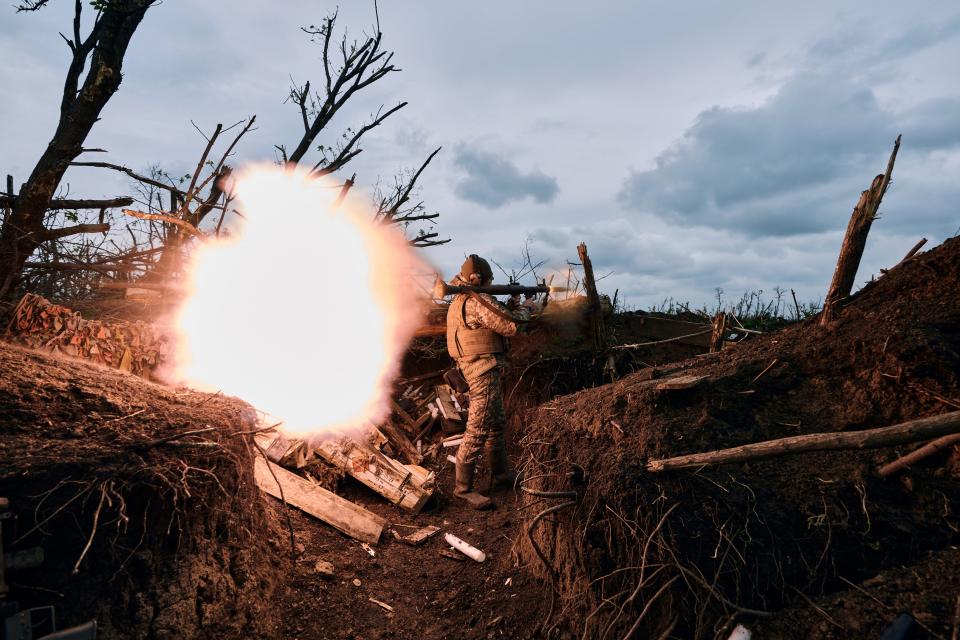Trench rats add disgust to the nasty conditions in Russian lines
Photos and videos show rat-infested Russian trenches along the front line.
Rats have long infested trenches in war and can spread diseases to troops, as they famously did in World War I.
Russian troops are experiencing other degrading war-time conditions as Ukraine's winter approaches.
New footage apparently from inside Russian trenches show hoards of rats and mice, the latest sign of increasingly disgusting and degrading warttime conditions for troops on the battlefield.
On Thursday, open source information accounts on X, the social media site formerly known as Twitter, shared photos and videos of rats from infestations in Russian trenches in the occupied Donetsk region, just east of Avdiivka, where Russian forces are currently conducting an slow-moving and costly but dangerous offensive.
One photo showed what appeared to be a large dead rat lying next to a rifle for size comparison. The photo was originally posted by a Russian milblogger but deleted after.
—OSINTtechnical (@Osinttechnical) October 27, 2023
Then, a video also shared online showed dozens of mice crawling on and underneath what looks to be a bed in the trench. Originally posted on Telegram, the video accompanies photos of what a Russian troop said were a pair of shoes chewed apart by rodents.
—OSINTtechnical (@Osinttechnical) October 27, 2023
Insider was unable to independently verify the locations of the photos and videos, which comport with images seen of Russia's frontline sleeping quarters but have rarely been visited by Western journalists.

Rats have long been a problem in trench warfare. In World War I, when trenches along the Western Front were filled with waste, food, and dead bodies of troops, rat populations exploded. They made their homes in trench walls and barracks, adapting to constant enemy shelling and harsh conditions. Rat problems became so hazardous that soldiers often hunted them, or employed dogs and cats to the job.
One troop, Lieutenant Rayner of the 3rd Brigade of the Canadian Field Artillery, said in February 1918: "The darn rats are as big as rabbits & as friendly. Was looking out through the peephole trying to get a line on Fritzies [the Germans] flash & one of them came & sat right in front of the compass, I reached for my gun but he moved too quickly for me," according to The Canadian Center for the Great War.
Rats are not only able to spread diseases and illnesses to troops; they're also a major morale problem that causes distress and discomfort. In WWI, they regularly ate leftover food, limiting already scarce rations. And in more gruesome instances, rats would also feast on bodies of dead soldiers still in trenches.

It's far from clear how widespread the rat issue is, but their presence in some Russian trenches adds to the already degrading conditions along the front lines for Russian troops. In recent weeks, as Ukraine's counteroffensive in southern Zaporizhzhia region has slowed down and Russia began launching smaller offensives along the eastern front, plenty of examples of Moscow's apparent disregard for its soldiers have cropped up.
In Avdiivka, a contested eastern Ukrainian area right on the edge of Russian occupied territory, Russia's military appears to again be using "human wave tactics," a gruesome practice involving sending masses of poorly trained and ill-equipped soldiers into frontal attacks to try to overwhelm defenders. They previously used the strategy last winter, resulting in devastating Russian casualties and likely adding to low morale.
In a press briefing Thursday, White House National Security Council spokesperson John Kirby said Russia had long exhibited a lack of ability to support its soldiers on the front lines. "They are in such desperate need to make some kind of progress," he said. "They are literally throwing young men into the fight who haven't been properly trained, haven't been properly equipped, and certainly are not being properly led."
Kirby also accused the Russian military of executing soldiers who refuse to follow orders. "It's reprehensible to think that you would execute your own soldiers because they didn't want to follow orders," he said, adding: "Now, threatening to execute entire units — it's barbaric. But I think it's a symptom of how poorly Russia's military leaders know they're doing, and how bad they have handled this, from a military perspective."
Read the original article on Business Insider

 Yahoo News
Yahoo News 
